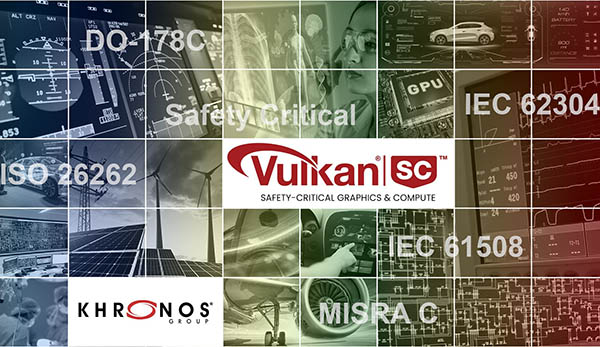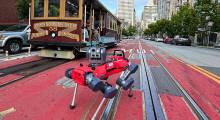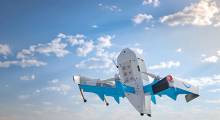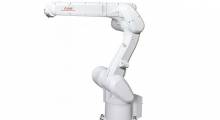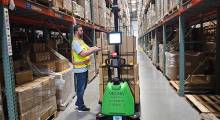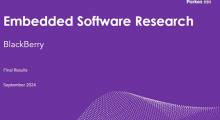CoreAVI today announced that The Khronos Group's Vulkan SC API has been ratified, enabling CoreAVI to offer developers standards-based implementations of functionally safe software stacks for embedded applications. The company said the open standard will allow it to offer scalability and reuse for systems such as robots and autonomous vehicles.
“As we transition to an autonomous world and the challenge of developing safety-critical systems only becomes more complex, the implementation of open standards for safety-critical applications becomes critical to success,” stated Damian Fozard, CEO of CoreAVI.
“We’re excited that the newly ratified Vulkan SC API provides an open standard for safe software development and allows our customers the freedom and scalability they need to deploy safety-critical systems across all industry verticals in ways that were previously unachievable,” he said.
Core Avionics & Industrial Inc., which does business as CoreAVI, provides graphics and compute drivers and libraries, “system on chip” (SoC) and discrete graphics processor components, and certifiable platform hardware IP. The Tampa, Fla.-based company said its software suite supports autonomy, machine vision, and artificial intelligence in the automotive, aerospace, defense, and industrial Internet of Things (IIoT) markets.
Growing robot use cases demand safety
“There's always a need for more safety, and industry has realized that robots are safer for both the workers on the factory floor and the environment,” said Neil Stroud, vice president of marketing and business development at CoreAVI. “Use cases are changing for robotics, such as the uncaging of robots for collaboration and massive deployments of mobile robots. Trends coming together this year are driving safety to the top of the agenda.”
At the same time, safety responsibilities are often spread across hardware, software, and the infrastructure, and they shouldn't be an afterthought, Stroud told Robotics 24/7. “With more vectors like mobile robots or fixed robots, integration becomes more complex, and there's no silver bullet,” he added.
“Historically, safety has been part of the robotics sales pitch, but interoperability is key,” he said. “If diverse pieces of equipment from multiple vendors aren't talking to one another, it's a challenge that we can address. The open standard is a win-win for developers, OEMs, and deployers of robotics.”
CoreAVI sets goals for Vulkan SC API
CoreAVI developed the Vulkan SC application programming interface (API) in close partnership with the Khronos Group based on the Vulkan and OpenGL low-overhead, high-performance graphics standards.
The company said its Platforms for Safety Critical Applications are based on VkCore SC, which is aligned with the Vulkan SC API and addresses the needs of safe graphics and compute applications across markets.
“We looked at how to achieve the maximum GPU performance with the Vulkan API and talked as a working group, with individual suppliers, and with customers,” Stroud explained. “We're seeing some convergence of safety and security standards as well.”
“Approval of the API was always a goal, and it was also a formal process of putting the standard in front of industry players,” he noted. “We've also gotten broad industry buy-in as well, with a vote two-and-a-half years ago. From that point on, we've worked with the organization to bring the standard to reality.”
Standard promises to enable both safety and performance
“There's a common mindset of trading off performance for achieving safety, which happens with lockstepping CPUs, where you get the performance of one but maximum safety,” said Stroud. “What's great for robotics is that Vulkan SC can be targeted at safe human-machine interaction and safe compute—it's a common API for both graphics and compute interchangeably.”
The Vulkan SC API, which received official ratification yesterday, allows software developers to abstract safety functions from the underlying hardware platforms and build other layers on top of it, he explained. “Why not spend time focusing on what you do best and use our foundational piece to get to market faster?” Stroud said.
“When we think of AI, there's the expression, or building and training of models, and the execution, which we focus on,” Stroud said. “The challenge for the industry as a whole is that execution has to be deterministic in nature, and AI has to categorize in time. With CoreAVI, Vulkan SC, and libraries on top, we can bring other tools across and deploy them deterministically.”
“CoreAVI believes that open standards help innovation and don't harm differentiation,” he said. “From AGVs [automated guided vehicles] to fork trucks, there's going to be reuse of the stack on top of compute, and economies of scale from autonomous vehicles. With common infrastructure, we can get more funcationality from the warehouse to more unconstrained environments like last-mile delivery.”
“It still allows for proprietary pieces on top, such as control algorithms for robots, depending on their use cases,” added Stroud. “By enabling developers to deploy and scale more quickly, Vulkan SC reduces the total cost of safety and allows for faster return on investment. We're actively engaged with automakers and semiconductor providers to pre-integrate the silicon and certified software.”
Processor providers endorse safety system
“Functional safety is crucial to the autonomous future,” stated Tom Conway, senior director of product management for the automotive and IoT lines of business at chip maker Arm Ltd. “Our ongoing partnership with CoreAVI continues to bring safety to the Mali GPU software ecosystem, and the ratification of the new Vulkan SC API will further enable developers to unlock the power of safety-critical autonomous systems in applications such as robotics, vehicles, and factories.”
“NXP is pleased to support CoreAVI on their VkCore SC driver technology enabling the newly ratified Vulkan SC API,” added Dan Loop, vice president and general manager of automotive edge processing at NXP Semiconductors. “As CoreAVI's long-time partner on our i.MX applications processors, NXP is dedicated to expanding our graphics driver enablement into broad market safety applications requiring advanced graphics and compute.”
“We already have collaborated with CoreAVI in demonstrating ISO 26262-compliant digital instrument clusters,” said Tero Sarkkinen, founder and CEO of Basemark. “We’re very much looking forward to further collaborations with CoreAVI on Vulkan SC as it enables not only graphics, but also fast and safe compute that is a building block for next-generation autonomous drive and ADAS [advanced driver-assist system] functions in automotive.”
About the Author
Follow Robotics 24/7 on Linkedin
Article topics
Email Sign Up

